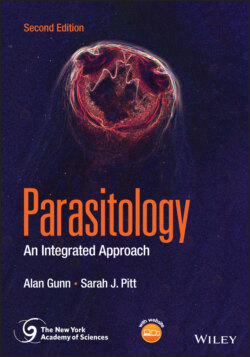Читать книгу Parasitology - Alan Gunn - Страница 21
1.2.5 Parasitism
ОглавлениеParasitism is a surprisingly difficult term to describe, and there are numerous definitions in the literature. We have adopted the definition that: ‘parasitism is a close relationship in which one organism, the parasite, is dependent on another organism, the host, feeding at its expense during the whole or part of its life (− +)’. Parasitism is frequently a highly specific relationship that always involves a degree of metabolic dependence of the parasite upon its host and often, though not always, results in measurable harm to the host. The association is usually prolonged, and although it may ultimately result in the death of the host, this is not usually the case. It is therefore distinct from predation in which the predator usually quickly kills and consumes its prey. However, owing to the complexities of animal relationships, there are always ‘grey areas’ in which any definition starts to become unstuck. This is particularly apparent in the case of animals that feed on blood. Mosquitoes and tsetse flies are not considered parasites because they only feed for a few seconds or minutes before departing. By contrast, hookworms and crab lice are parasites, because they live in permanent associated with their host. Blood‐feeding leeches and lampreys, however, are free‐living organisms that attach to their victim for several hours whilst taking a blood meal; some authors consider them parasites, whilst others define their feeding as a type of predation.
